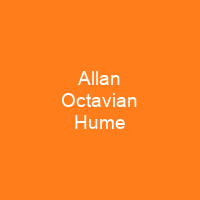Who Was Allan Octavian Hume?
Allan Octavian Hume, CB ICS, was a multifaceted figure in British India, blending roles as an administrator, reformer, and naturalist. Born into a family of nine children, his journey through life was marked by diverse interests and significant contributions to both the political and scientific spheres.
Political Reformer and Administrator
Hume’s role in British India was not just administrative; it was transformative. As an administrator, he worked tirelessly to improve the lives of common people in Etawah, a district that later became a model of development after the Indian Rebellion of 1857. His efforts included introducing free primary education and holding public meetings for support. He even started a Hindi language periodical, demonstrating his commitment to fostering local culture and education.
Founder of the Indian National Congress
The founding spirit behind the Indian National Congress, Hume’s vision was clear: self-rule for India. His work in this area was not just theoretical; he actively engaged with the political landscape, advocating for Indian interests and eventually leaving India to live in London where he continued his advocacy.
Scientific Contributions
Hume’s passion for science led him to make significant contributions as an ornithologist. He built up a vast collection of bird specimens at his home in Shimla, which later became the Hume Collection, now housed in the Natural History Museum in London. His work on birds was extensive and meticulous, leading to the description of many species.
Ornithological Legacy
Hume’s journal Stray Feathers, started in 1872, promised to be a useful catalogue of Indian birds. His dedication to ornithology is evident from the sheer volume of his work: over 2500 bird specimens collected from the Etawah area alone. He also sent out trained bird-skinner assistants and spent around £1500 annually on surveys.
Botanical Interests
After losing interest in ornithology due to lost manuscripts, Hume shifted his focus to horticulture and scientific botany. He established the South London Botanical Institute, promoting the study of botany in South London. His work here included collaborating with W.H. Griffin on developing a herbarium and arranging botanical trips together.
Philosophical and Theosophical Influences
Hume’s interest in theosophy took root around 1879, leading him to connect with Indian thinkers and create the idea of the Indian National Congress. His work on philosophical basis of Theosophy was rejected by key Theosophists, but his contributions to this field remain significant.
Legacy
Hume’s legacy is multifaceted. He left behind a rich collection of bird specimens and ornithological writings that continue to be valuable resources for researchers today. His work on agricultural reform in India, as well as his contributions to the Indian National Congress, have had lasting impacts on both scientific and political landscapes.

As we reflect on Allan Octavian Hume, it’s clear that his life was a testament to the power of multifaceted interests and dedicated service. His journey from an administrator to a naturalist and political reformer showcases the breadth of his contributions to India’s development and its quest for self-rule.
Would you like to know more about Allan Octavian Hume’s legacy? Explore his works, writings, and the impact he had on both scientific and political fronts. His story is one of dedication, innovation, and a deep commitment to the betterment of India.
You want to know more about Allan Octavian Hume?
This page is based on the article Allan Octavian Hume published in Wikipedia (retrieved on November 30, 2024) and was automatically summarized using artificial intelligence.







